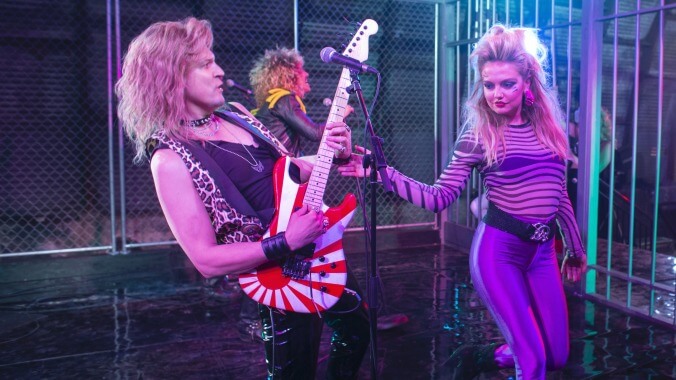This week’s The Deuce suggests that the ‘80s may have been our porniest decade


In the 1980s, everything looked like porn. Patrick Nagel posters. Daytime soap operas. Primetime soap operas. Tom Cruise movies. Miami Vice. Televangelism. Heavy metal. Pro wrestling. Pro wrestling videos, packaged in cheap cases with garish, poorly reproduced cover art. Prince, just in general.
In the “Just Say No” era, drugs were off the table—at least as a socially acceptable norm. But sex was very much in play. Credit premium cable, running Porky’s and Porky’s clones after midnight, every night. Credit mom-and-pop video stores, making their real money off tapes they stashed in a special room, behind a beaded curtain. Credit ZZ Top and Van Halen, filling their videos with curvy, big-haired gals in lacy lingerie. The ‘80s were an era when an R rating implied nudity, even in action pictures with mostly male casts. AIDS may have made Americans less inclined to sleep around, but popular culture at least gave horny men and women plenty to dream about.
It’s those larger trends that gave Lori Madison the moxie to press her agent Kiki a few The Deuce episodes ago about the availability of more mainstream roles. Porn stars in the ‘80s popped up periodically in widely released horror movies and teen sex comedies. And bands like the fictional hair metal act Contagious—seen in in this week’s episode recording their video for “She’s A Devil,” with Lori writhing provocatively around the lead singer—also courted the hazy eroticism of contemporary adult entertainment. In 1985, the aesthetics of XXX and MTV were becoming indistinguishable.
On the Contagious video set, Lori gets treated like a VIP: given compliments and offered her pick of food from craft services. The next day though, while filming Fertile Valleys High—where she plays a teacher too dumb to know who George Washington is—Lori has a hard time even getting the director to agree that her co-star should put on a condom before their anal scene. Later, when she complains to Kiki that another actress on her movie has a bruised face after a scene “got out of hand,” her agent shrugs, “Is this your business? Is it mine?… I don’t get a percentage of Brandy, do you?”
The point is this: While everyone may have been trying to latch onto some porno chic circa 1985, this wasn’t making life any easier for sex-workers, who were still exploited, underpaid, abused, and stigmatized.
That’s evident in one of the other major subplots this week, involving Joey’s ongoing adventures on Wall Street. He’s a clerk, hustling his way toward becoming a broker, primarily by hooking his superiors up with prostitutes. When his father Bobby visits, he can’t disguise his disgust at his son’s delusions of grandeur. Bobby’s been around long enough to know that guys like the Dwyers and the Martinos are never going to be respected by the upper-class. They only get invited to the good parties if they can provide drugs and girls.
That said, Bobby is more than happy to take the pricks’ money. In a “like father, like son” moment, Joey wheedles a little extra cash from his clients, when more show up for one of his little sex shindigs than he’d pre-arranged with the ladies. But he then gives the extra dough not to the hookers, but to his dad, who’s now more impressed with Joey’s burgeoning outcall business… but not so impressed that he’s excited about paying for his employees’ beepers, or reimbursing them for transportation to and from these upscale locations. The women, as always, are on their own.
The same goes for their reputations. The title of this episode is “Normal Is A Lie,” which is a comment Eileen makes to her new boyfriend Hank. Continuing her policy of being absolutely honest, Eileen tells Hank all about her runaway son Adam, who only calls home when he needs money. She explains that she made a decision when she was young that she wasn’t going to live her life by “someone else’s idea of what’s ‘normal.’” But while she’s happy with who she is, she regrets that her son—who didn’t have a choice about what his mom did for a living—has had to deal with the repercussions of her freedom.
On the flip side of the Eileen story, this week Melissa is confronted by her father, Matthew (played by the magnificent David Morse), who apparently was an abusive drunk when she left home at age 14, back in 1966. Now he’s sober and remorseful, and with the help of a corrupt vice cop, he tracks his daughter down in New York, following the lead of a production company address on one of her porno tapes. In a heartbreaking, well-staged scene, the two forge a tentative reconciliation through the narrow gap in her cracked apartment door. It’s a moment of hope, suggesting that people that maybe people can change, and can come back around to the idea that family connection is more important than lingering hurt feelings. Perhaps this foreshadows a more positive outcome for Eileen and Adam, by season’s end.
There’s a lot in this episode about expectations and perceptions versus reality. That’s the main theme in the scenes involving the Martino brothers: Frankie, who’s back to his old habits of valuing quick cash over profitable long-term relationships, as he dilutes the cocaine he’s selling to angrily unsatisfied customers; and Vincent, who in a quietly poignant scene talks to Abby about how he used to daydream about the pretty picture of middle class life his father kept around, until he realized they were all phony. (Again: Normal is a lie.)
But the real story this week is about the future for the Loris and the Eileens, who’ve gone a long way toward taking control over their own lives, but still remain defined by decisions they made over a decade ago. By the end of the episode, Lori is barely interested in hearing her boyfriend talk about forming an independent production company, but she’s captivated by the troubadour she hears when she attends a nightclub’s open-mic night—perhaps because she’s thinking of switching careers, or perhaps because she’s reminded of how much she enjoyed her time as a music video hottie, where one of the musicians showed her the basics of guitar. Eileen, meanwhile, turns down Hank’s offer to pay for her latest movie, because she’s had plenty of experience with seeing financial transactions change relationships.
Like Bobby, Eileen is cynical—or perhaps just clear-eyed—about rich folks’ promises. Neither of them grew up like Abby, who came from money, and can navigate that world fairly easy. That’s the case again in “Normal Is A Lie,” where she attends a gallery show at the invitation of a leftist activist lawyer friend she grew up with, and is immediately drawn to a hip downtown artist named Pilar (Paloma Guzman).
Abby and Pilar go dancing at Paradise Garage, after smooching on the street. Pilar also takes Abby to Avenue A to look at the kind of graffiti art she makes, which she says shouldn’t be hanging on some wall. That’s a persuasive claim she’s making, about how “authenticity” matters in art. But it’s the same kind of argument that appropriators and dilletantes often make. It’s a well-meaning worldview, but one that kept ‘80s porn actresses working for a pittance, while others make a fortune building a whole fantasy world around their image.
Stray observations
- Last season I felt like Paul’s storyline was underdeveloped, compared to the rest of The Deuce’s characters. This season, with the AIDS crisis in the mix, Paul’s stories have been more prominent. (This week, for example, he provides emotional support to his boyfriend Todd, whose HIV status is forcing him to revaluate his career and life priorities.) This year, the character I wish we saw more is Detective Alston, whose campaign to clean up Times Square by any means necessary—even if that means making real estate assholes richer—may end up being the most significant narrative driver, as this series nears its end. Still, it is pretty badass in this episode when Alsston makes an appointment with a psychiatrist, just so he can threaten him with the tabloid headline he knows is coming: “Park Avenue Shrink By Day, Brother Owner By Night.”
- Not a lot of comic relief in The Deuce this year, so I welcome every second of perverse absurdity. There were two in particular this episode. In one, an adult bookstore proprietor hands a customer his purchase, takes note of the rubber dildo flopping over the top of the package, and mutters, “You’re gonna need a bigger bag.” And Lori has a good line herself, when her agent warns her against eating roast beef the night before an anal scene. She pops back with, “Enemas are a girl’s best friend. I got a system, Kiki.”